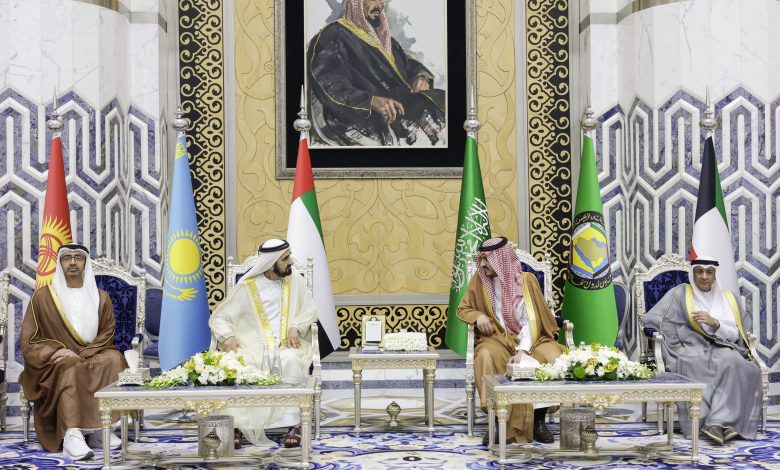From Abu Dhabi to Jeddah… “Consultative Summits” Enhance Gulf Cooperation”

Jeddah, Saudi Arabia, hosts a consultative summit on Wednesday for the leaders of the Gulf Cooperation Council (GCC) countries, in meetings that constitute an important mechanism for solidarity and cooperation
Consultative summits are a significant mechanism for enhancing Gulf solidarity and cooperation. They were agreed upon and approved during the Gulf Summit chaired by Sheikh Zayed bin Sultan Al Nahyan, the founder of the United Arab Emirates, held in Abu Dhabi from 7th to 9th December 1998.
From Abu Dhabi, in an important step in the journey of the Gulf Cooperation Council, an agreement was reached during that summit to hold a semi-annual consultative meeting for the leaders of the GCC countries between the previous and subsequent summits.
The first consultative summit took place approximately five months after the Abu Dhabi summit and was held in Jeddah in May 1999.
With the convening of the 18th consultative summit, the Gulf nations commemorate the pioneering Emirati efforts to enhance Gulf solidarity since the agreement and establishment of the GCC by the leaders of the six Gulf countries (Saudi Arabia, the UAE, Kuwait, Bahrain, Oman, and Qatar) officially, during the first summit held in Abu Dhabi on 25th and 26th May 1981, in response to the invitation of Sheikh Zayed bin Sultan Al Nahyan.
The First in Six Years
This summit holds special importance for several reasons, notably being the first Gulf consultative summit in six years.
With the meeting, the leaders of the GCC countries resume an important mechanism to strengthen Gulf solidarity after a hiatus of several years.
The 17th consultative meeting of the GCC leaders was held in the Saudi capital, Riyadh, on 21st May 2017.
The consultative summits were suspended during the crisis with Qatar, which was resolved during the 41st Gulf Summit held in Al-Ula, northwestern Saudi Arabia, on 5th January 2021. This summit witnessed the reconciliation of the Gulf states and the strengthening of solidarity among them.
During the Al-Ula Summit, a statement consisting of 117 clauses, named the “Al-Ula Declaration,” was issued. It included the Gulf countries’ vision for enhancing cooperation in various fields and their positions on Arab and international issues.
The Gulf leaders emphasized their commitment to the strength and cohesion of the GCC, standing together as one in the face of any threat to any member state.
The “Al-Ula Declaration” also highlighted Gulf, Arab, Islamic solidarity and the reinforcement of unity and cohesion among the GCC countries, the return of joint Gulf cooperation to its natural course, and the preservation of security and stability in the region.
Following the agreement, steps were taken towards restoring normal relations between Qatar on one side and Saudi Arabia, the UAE, Egypt, and Bahrain on the other over the past two years.
With the convening of the 18th consultative summit, the Gulf Cooperation Council countries resume an important mechanism to enhance Gulf solidarity and integration among their nations, restoring all mechanisms of Gulf cooperation to their natural course on various levels.
The First Gulf Summit with Central Asian Countries
This meeting also holds special significance as it coincides with the first Gulf summit with Central Asian countries, as part of the Gulf countries’ efforts to diversify alliances and partnerships with various nations worldwide, in favor of their own countries and in support of stability and prosperity in the region and the world.
The summit also aims to “establish a kind of partnership and develop mechanisms to ensure the sustainability of consultation, dialogue, and cooperation.”
The summit is attended by the leaders of the GCC countries and representatives thereof, as well as the leaders of Central Asian countries known as the C5 (Kazakhstan, Kyrgyzstan, Tajikistan, Turkmenistan, and Uzbekistan).
The summit comes after approximately 10 months since the first joint ministerial meeting for strategic dialogue between the GCC and Central Asian countries held in Riyadh on 7th September last year, with the participation of the foreign ministers of both sides.
At the end of their meeting, the foreign ministers affirmed their commitment to establishing a strong and ambitious future partnership between their countries, based on shared values, interests, and deep historical ties between their peoples, and the bilateral and multilateral cooperation in various fields.
The meeting witnessed the adoption of the Joint Action Plan for Strategic Dialogue and Cooperation between the GCC and Central Asian countries for the period 2023-2027, including political and security dialogue, economic and investment cooperation, enhancing people-to-people communication, and establishing effective partnerships between the business sectors in the GCC countries and Central Asian countries.
The ministers emphasized taking the necessary measures for the full implementation of this plan on both the bilateral and multilateral levels.
Consecutive Summits
This consultative meeting is the second Gulf summit within eight months after the 43rd Gulf Summit held in Riyadh on 9th December last year.
It is also the fifth Gulf summit within a year, including the first Gulf summit with Central Asian countries.
Preceding these two summits were three summits: the 43rd Gulf Summit and the first Gulf-China Summit, both held in Riyadh on 9th December last year.
Saudi Arabia also hosted a Gulf-American summit with the participation of Jordan, Egypt, and Iraq (Jeddah Summit for Security and Development) on 16th July 2022, during the visit of U.S. President Joe Biden to the Kingdom. It was the first of its kind for the Middle East since he assumed office.












